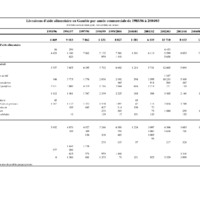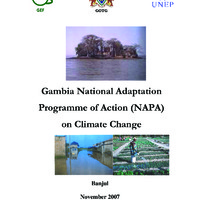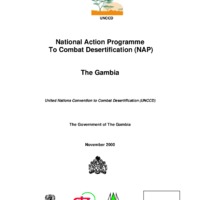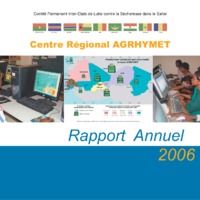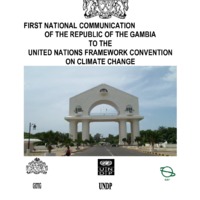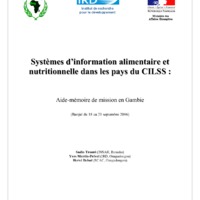Recherche
6 items
PANLCD Gambie
The Second National Forum adopted the “National Action Programme to Combat Desertification in The Gambia” in Banjul on the 27th of September 2000. Preparation of the National Action Programme (NAP) was coordinated by the Forestry Department, the Focal Point for implementing the United Nations Convention to Combat Desertification in The Gambia (UNCCD). Formulation of the NAP was the result of a broad, consultative process, involving central government and its line agencies, local government institutions, Non Governmental Organisations and, most importantly, communities all over the country whose perceptions, views and proposal were gathered in zonal and divisional meetings, numerous interviews and statements. At the First National Forum held in November 1998, five thematic areas were identified for in-depth consideration in the NAP. These included: Forestry and Wildlife Management; Agriculture, Soil and Water Conservation; Livestock Production and Range Management; Population and Social Dimensions of Desertification; and Institutional Arrangements. Five separate sectoral studies were prepared by international and national consultants, identifying the key issues for each sector, progress made in the fight against desertification, and areas requiring immediate and medium-term action. Based on this analysis, the Second National Forum was held, and the final National Action Programme adopted. Technical and financial support was extended by the Deutsche Gesellschaft für Technische Zusammenarbeit (GTZ) GmbH, through the Deutsche Forstservice (DFS) GmbH, the United Nations Sahelian Office (UNSO), the United Nations Development Programme (UNDP), the Secretariat of the UNCCD, and the Permanent Inter-State Committee to Combat Drought in The Sahel (CILSS). The Gambia is, a small and poor country, but, nevertheless, has made substantial progress in key areas of relevance to The Convention. Headway has been made in The Gambia in reversing the trend of deforestation, and the future looks promising in these areas indeed. In fact, elements of the Gambia Forestry Management Concept are being taken-up in the Sub-Region and beyond. The National Action Programme is structured with a brief introduction and presentation of background information on The Gambia in Sections 1 and 2. These sections set the stage for the discussion of the impact of desertification in The Gambia in Section 3. Section 4 covers the NAP preparation process and provides a synopsis of analysis provided by the five sectoral studies commissioned during the NAP preparation. Finally, the National Action Programme is detailed in Section 5, including guiding principles, priority measures, institutional and financial arrangements, and monitoring and evaluation of the NAP. A brief summary of the Second National Forum with key conclusions and recommendations follows. In Appendix A, a matrix summarises the key stra 3 tegic areas requiring priority action. A full investment programme will follow in early 2001. On behalf of the Government of The Gambia, I would like to express my deep appreciation to the numerous NAP contributors, namely, the Desertification Core Group, the Task Force on Desertification, the Agriculture and Natural Resources (ANR) Working Group, representatives from technical line agencies, Non-Governmental Organisations (NGOs), Community Based Organisations (CBOs), national and international consultants, donors, and above all, the invaluable input from the communities. The Action Programme is by no means an end in and of itself, but a call for action. Success or failure will have to be gauged against perceivable and tangible improvements in the livelihood of Gambian communities. Hence, there is no “final version” of the Action Programme. NAP is a process, which involves continuous correction, revision and refinement. All institutions, the international community and, above all, the Gambian public are encouraged to further contribute to the process through their critical participation.
Rapport annuel 2006 Centre Régional AGRHYMET
L'année 2006 a connu de nombreuses actions de d'information et de formation, notamment l'ouverture du Mastère en Gestion concertée des ressources naturelles
Republic of gambia, initial national communication
On behalf of the Government and people of the Republic of The Gambia, it is a great honour and pleasure for me to present this First National Communication of The Gambia to the United Nations Framework Convention on Climate Change (UNFCCC). The development of this First National Communications has enabled my Department of State to develop an institutional framework that has brought together and consolidated the networking and dialogue between different economic sectors, CBOs and NGOs, and grassroots level communities. Technicians and scientists of different backgrounds and disciplines have pooled their expertise and worked together to develop this informative document. In this National Communication we have outlined the emissions of greenhouse gases from the major economic sectors and activities of the country, developed plausible climate change scenarios and based on these scenarios we have assessed the potential impacts of the projected climate change. The National Communication also contains measures and strategies to mitigate the concentration of greenhouse gases in the global atmosphere and adapt to the negative impacts of climate change. No detailed cost-benefit analysis was conducted on the mitigation and adaptation measures due to inadequate capacity to cost the effects of climate change. The potential impacts of climate change on crop production, biodiversity and wildlife, coastal resources, forestry, fisheries, rangelands and livestock, and water resources have been studied in great detail. Most of the impacts are negative and the populations are vulnerable. Although The Gambia is a small country, there are opportunities to invest on small-scale projects to mitigate greenhouse gas emissions and adapt to adverse impacts of climate change. These projects would be in policy development, fuel switching including the efficient use of both renewable and non-renewable energy, use of efficient modes of transportation and conservation and sustainable use of forests. Cooperation between developed countries and The Gambia will enable all Parties to meet their commitments based on the principle of common but differentiated responsibility. The mitigation and adaptation measures presented in this first national communications will require funding to build national adaptive capacity and provide appropriate technologies to address climate change.
Systèmes d’information alimentaire et nutritionnelle dans les pays du CILSS : Aide-mémoire de mission en Gambie
Lors de la réunion du Réseau de prévention et de gestion des crises alimentaires, tenue à Paris en décembre 2005, une recommandation a été formulée dans le sens d’améliorer le fonctionnement des systèmes d’alerte précoce, notamment en envisageant les moyens d’intégrer dans les critères de surveillance et d’alerte précoce, des informations de type nutritionnel. Le Ministère français des Affaires Etrangères (MAE) a exprimé son souhait de financer cette initiative dans le cadre d’un projet sous-régional qui serait conçu dans de meilleurs délais sous réserve que des aspects de surveillance nutritionnelle et d’alerte précoce retenus s’appuient sur des dispositifs déjà existants dans les pays sahéliens. A ce titre la nécessité de réaliser diverses missions exploratoires dans certains pays du CILSS1 (Mali, Sénégal, Mauritanie, Tchad et éventuellement Gambie)2 a été initiée afin de déterminer les aspects techniques et opérationnels d’une future action. A ce titre les trois institutions suivantes sont concernées par l’initiative : 1. Le CILSS en tant qu’organisation régionale en charge des questions de sécurité alimentaire, recherchant la mise en œuvre des recommandations du Réseau des Prévention et Gestion des Crises alimentaires ; 2. L’Institut de Recherche pour le Développement (IRD) en tant qu’organisme français de recherche disposant d’une unité de recherche en nutrition ; 3. Le Ministère des Affaires étrangères Français restant très impliqué dans les aspects de prévention et de gestion des risques alimentaires au Sahel. L’ancrage institutionnel permettant au mieux de loger et conduire ces missions à terme a porté sur le Secrétariat Exécutif du CILSS.
